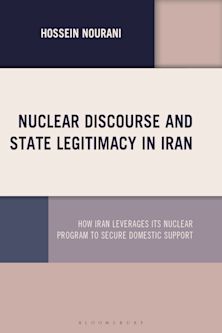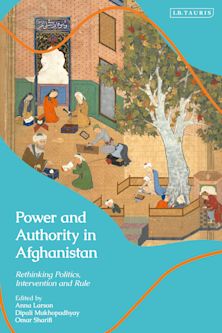- Home
- ACADEMIC
- Middle East
- Conflict and Security Studies
- Syria and the Neutrality Trap
Syria and the Neutrality Trap
The Dilemmas of Delivering Humanitarian Aid through Violent Regimes
Syria and the Neutrality Trap
The Dilemmas of Delivering Humanitarian Aid through Violent Regimes
You must sign in to add this item to your wishlist. Please sign in or create an account
Description
The Syrian war has been an example of the abuse and insufficient delivery of humanitarian assistance. According to international practice, humanitarian aid should be channelled through a state government that bears a particular responsibility for its population. Yet in Syria, the bulk of relief went through Damascus while the regime caused the vast majority of civilian deaths. Should the UN have severed its cooperation with the government and neglected its humanitarian duty to help all people in need? Decision-makers face these tough policy dilemmas, and often the “neutrality trap” snaps shut.
This book discusses the political and moral considerations of how to respond to a brutal and complex crisis while adhering to international law and practice. The author, a scholar and senior diplomat involved in the UN peace talks in Geneva, draws from first-hand diplomatic, practitioner and UN sources. He sheds light on the UN's credibility crisis and the wider implications for the development of international humanitarian and human rights law. This includes covering the key questions asked by Western diplomats, NGOs and international organizations, such as: Why did the UN not confront the Syrian government more boldly? Was it not only legally correct but also morally justifiable to deliver humanitarian aid to regime areas where rockets were launched and warplanes started? Why was it so difficult to render cross-border aid possible where it was badly needed? The meticulous account of current international practice is both insightful and disturbing. It tackles the painful lessons learnt and provides recommendations for future challenges where politics fails and humanitarians fill the moral void.
Table of Contents
Abbreviations
1. Introduction to a Tough Dilemma
2. Expectations and Disillusions Beyond Syria
3. Containing the Human Beast: Fundamentals of International Humanitarian and Human Rights Law
The Government's Particular Responsibility
State-centred International Practice
Neutrality and Impartiality
Countries' Controversial Consent
4. A Moving Target: Dynamics of International Humanitarian and Human Rights Law
Law or War
An Octopus with Dwindling Force
Contested Notions of State Sovereignty
5. The Terrorism Tool: De-humanizing the Other
The Sin of Rage at Ground Zero
The Myth of the Unlawful Combatant
Poisonous Rhetoric
A Self-fulfilling Prophecy
6. De-Neutralizing Aid: All Roads Lead to Damascus
The Government's Grip on Humanitarian Work
Syrian Arab Red Crescent's Plight in a Totalitarian System
Western Diplomats' Dilemma
Cross-Border Controversies in the Security Council
7. In the Pillory: The UN's Syria Dilemma
Complicity with Evil
Contracting Dangerous Bedfellows
Between All Fronts
8. Credibility Crisis
The UN Reacts
Donors React
9. Diversifying Aid: Roads to Circumvent Damascus
“Humanitarian Plus”
A Double-edged Sword
The Reconstruction Gamble
10. Irreconcilable Positions: Roads to Nowhere
Fig Leaf for Political Failure
Double Deficiency
Russia's Soft Power Failure
Contempt for Multilateralism
11. Arguments for Change: How to Avoid the Neutrality Trap
Conclusion
Bibliography
Index
Product details
| Published | 20 May 2021 |
|---|---|
| Format | Ebook (PDF) |
| Edition | 1st |
| Extent | 200 |
| ISBN | 9780755641406 |
| Imprint | I.B. Tauris |
| Publisher | Bloomsbury Publishing |
About the contributors
Reviews
-
Hats off to Wieland for giving us food for thought at this critical crossroad in the evolution of humanitarian aid. I hope it leads the UN, donors, and humanitarian organizations to reflect seriously about how they can change their approach to delivering humanitarian aid during an armed conflict before we repeat the deadly mistakes of Syria.
The Middle East Journal
-
Wieland deserves ample praise for his decision to write a book that catalogs in exhausting detail the failings of an institution he admires so much. One hopes that his former colleagues understand the book as an effort to strengthen United Nations, not embarrass it.
War on the Rocks
-
A masterpiece, this book is a riveting call for action to prevent governments that massacre their own citizens from directing who shall, and who shall not, receive donor-funded life-saving emergency help.
Jeffrey Feltman, UN Under-Secretary-General for Political Affairs 2012-2018
-
A highly interesting and original study based on many years of practical and intensive experience of Carsten Wieland, who served as a diplomat and an academic, dealing with the Middle East, Syria in particular, also in the intra-Syrian negotiations under the auspices of the UN Special Envoy for Syria. This book clearly explains the complicated juridical, humanitarian and political dimensions of the various dilemmas of delivering humanitarian aid during wars. Wieland provides an authoritative guide on how to better deal with delicate humanitarian issues, like those in Syria. It should be highly recommended reading for politicians, humanitarian negotiators, people active in the field of humanitarian aid and other decision makers.
Nikolaos van Dam, Former Ambassador of the Netherlands and author of Destroying a Nation: The Civil War in Syria
-
This in an extraordinary book on humanitarian law and practice in the Syria conflict. By a scholar-practitioner with many years of experience studying Syria and acting as advisor to the UN mediator on the country, it is a model of how theoretical concerns and practical experience in policy making can cross fertilize each other.
Raymond Hinnebusch, Professor of International Relations, University of St Andrews Centre for Syrian Studies, UK
-
The most convincingly argued call yet to take international humanitarian aid out of the control of unaccountable governments that use sovereignty as a pretext - the ultimate exposure of sovereignty as fake neutrality.
Eberhard Kienle, Research Professor at the Centre des recherches internationales (CERI), Centre national de la recherche scientifique (CNRS) & SciencesPo, Paris, France

ONLINE RESOURCES
Bloomsbury Collections
This book is available on Bloomsbury Collections where your library has access.



































